Our major health issues cluster highlights research groups investigating and responding to prevalent diseases affecting our lives and wellbeing in New Zealand.
Visit the listings of our research groups or our featured projects:
ASPIRE2025
A University of Otago Research Theme
Research to achieve a tobacco-free Aotearoa
 ASPIRE2025 is a partnership between major New Zealand research groups carrying out research to help achieve the Government's goal of a tobacco-free Aotearoa by 2025. ASPIRE2025 brings together leading tobacco-free researchers and health service groups in New Zealand and strengthens existing collaborations. ASPIRE2025 was awarded the status of a University of Otago Research Theme in November 2011.
ASPIRE2025 is a partnership between major New Zealand research groups carrying out research to help achieve the Government's goal of a tobacco-free Aotearoa by 2025. ASPIRE2025 brings together leading tobacco-free researchers and health service groups in New Zealand and strengthens existing collaborations. ASPIRE2025 was awarded the status of a University of Otago Research Theme in November 2011.
Email: aspire2025@otago.ac.nz
Website: aspire2025.org.nz
Brain Research New Zealand | Rangahau Roro Aotearoa
Established as a Centre of Research Excellence (CoRE)
Developing capacity and capability in age-related neuroscience
BRNZ is co-hosted by University of Otago and University of Auckland. The Centre involves collaboration from researchers at Canterbury University and AUT, and clinicians at various District Health Boards.
BRNZ draws on New Zealand's world-class brain research capability to create a cohesive and mutually reinforcing national team. This collaboration brings researchers engaged in ageing-related neuroscience under one virtual roof, reducing competition and encouraging cooperation.
Brain Research New Zealand is a national enterprise that, through a coordinated research, training and education programme, develops new capacity and capability to address the increasing burden of ageing-related brain disorders
Email: brnzadmin@otago.ac.nz
Website: http://www.brnz.ac.nz/
Cancer Research at Otago | Rangahau Mate Pukupuku o Ōtākou
A University of Otago Research Strength
Cancer research expertise across the spectrum
 Cancer Research at Otago is a directory of research groups and collaborations associated with the University of Otago.
Cancer Research at Otago is a directory of research groups and collaborations associated with the University of Otago.
Explore our cancer research:
- Alphabetical listing of our cancer research groups
- Cancer at the cellular level
- Diagnosis and treatment
- Health policy
- Recovery and rehabilitation
- Susceptibility and prevention
Our website also has informative articles and short videos of researchers presenting easy-to-understand outlines of their research.
Email: healthsciences.research@otago.ac.nz
Website: otago.ac.nz/cancer-research
Cardiovascular Disease at Otago | Mate Iaia-Manawa ki Ōtākou
A University of Otago Research Strength
Addressing the health burden of CVD in New Zealand
 Cardiovascular disease (CVD) is the collective term for diseases of the heart and blood vessels. CVD kills more than one in three New Zealanders, and is responsible for more than 30,000 hospital admissions each year.
Cardiovascular disease (CVD) is the collective term for diseases of the heart and blood vessels. CVD kills more than one in three New Zealanders, and is responsible for more than 30,000 hospital admissions each year.
Cardiovascular Disease at Otago is a directory of research groups and collaborations associated with the University of Otago.
We aim to reduce the health burden of CVD through cultivating research excellence and improving health policy, workforce training, and practice.
Explore our cardiovascular disease research:
- Alphabetical listing of our CVD research groups
- Advances in treatments
- Diagnostic tools
- Health inequalities
- Population and community prevention
- Predispositions and risk factors
Our CVD website also has informative articles and short videos of researchers presenting easy-to-understand outlines of their research.
Email: healthsciences.research@otago.ac.nz
Website: otago.ac.nz/cvd
Centre for Health Systems and Technology | Te Pokapū Pūnaha Hauora, Hangarau Hauora
The Centre for Health Systems and Technology (CHeST) has a particular focus on the applied end of health system and technology research, supporting the translation of research into practice.
CHeST research has five themes:
- Health Care Delivery
- Health System Architecture, Management, and Performance
- Health Quality, Safety, and Community Engagement
- Health Workforce
- Health Technology
Email: chest@otago.ac.nz
Website: otago.ac.nz/healthsystems
Centre for Translational Cancer Research | Te Aho Matatū
A University of Otago Research Centre
Bridging the gap between laboratory-based science and treatment in the clinic
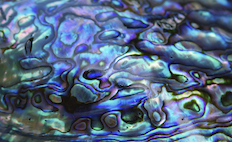 Translational cancer research bridges the gap between laboratory-based science and treatment in the clinic. We now have sufficient knowledge in the fields of cancer biology, molecular biology, and immunology to make a significant impact on the treatment and management of cancer.
Translational cancer research bridges the gap between laboratory-based science and treatment in the clinic. We now have sufficient knowledge in the fields of cancer biology, molecular biology, and immunology to make a significant impact on the treatment and management of cancer.
We're bringing about rapid improvements in cancer outcomes by addressing defined clinical problems. Our research is accelerating the development and testing of new drugs and diagnostic tools that directly assist clinicians and their patients.
Email: ctcr@otago.ac.nz
Website: otago.ac.nz/ctcr
Christchurch Heart Institute | Rangahau Manawa o Ōtautahi
A University of Otago Research Centre
Working to reduce the impact of cardiovascular disease
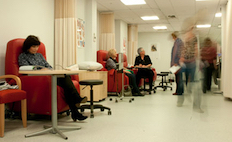 Here at the Christchurch Heart Institute we help save thousands of lives through research into improved diagnosis, better prediction and advanced treatments for heart disease. Our team of internationally-renowned experts directly play a role in increasing the survival of New Zealanders with heart disease.
Here at the Christchurch Heart Institute we help save thousands of lives through research into improved diagnosis, better prediction and advanced treatments for heart disease. Our team of internationally-renowned experts directly play a role in increasing the survival of New Zealanders with heart disease.
Our research focus includes:
- New blood tests for heart attack diagnosis and prognosis
- Using new methods for treating heart failure and improving outcomes
- Understanding the genetics of heart disease; why heart disease runs in some families
Email: paula.deroeper@otago.ac.nz
Website: otago.ac.nz/chch-heart-institute
Edgar Diabetes and Obesity Research (EDOR)
A University of Otago Research Centre
Reducing the global burden of diabetes and obesity
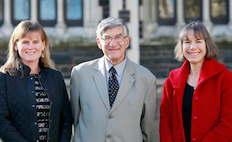 We aim to reduce the prevalence, and to improve the management, of diabetes and obesity by finding new ways to prevent and treat these conditions. By striving for research excellence and encouraging international collaboration we can bring the greatest benefit to New Zealanders and the wider world.
We aim to reduce the prevalence, and to improve the management, of diabetes and obesity by finding new ways to prevent and treat these conditions. By striving for research excellence and encouraging international collaboration we can bring the greatest benefit to New Zealanders and the wider world.
We're sharing our discoveries with individuals, communities, teachers, health professionals and policymakers.
Email: diabetes@otago.ac.nz
Website: otago.ac.nz/diabetes
Heart Otago | Manawa Ōtākou
A University of Otago Research Theme
Understanding the molecular nature of cardiac disease
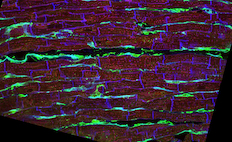 Heart Otago is comprised of cardiovascular researchers and clinicians located at the University of Otago and Dunedin Hospital. The goal of the group is to expand upon traditional cell and animal models to better understand the molecular nature of cardiac disease in patients with heart disease and to translate the laboratory-based cardiovascular research into the clinical setting.
Heart Otago is comprised of cardiovascular researchers and clinicians located at the University of Otago and Dunedin Hospital. The goal of the group is to expand upon traditional cell and animal models to better understand the molecular nature of cardiac disease in patients with heart disease and to translate the laboratory-based cardiovascular research into the clinical setting.
The strong link between fundamental researchers and clinicians allows the group to study cardiac disease from genetic mutations within a single protein, through tissue and animal models, to patients presenting with a range of cardiac anomalies.
Investigations involve a wide range of techniques including:
- Electrophysiology
- Cell imaging
- Genetic and biomarker screening
- Multicellular human tissue and whole animal heart function measurements
- Human and animal in vivo cardiac function via echocardiography
Email: heart@otago.ac.nz
Website: otago.ac.nz/heart-otago
Infectious Disease Research at Otago | Rangahau Mate-hōapa ki Ōtākou
A University of Otago Research Strength
Addressing the health burden of infectious disease in New Zealand
 This website highlights the research expertise and activities of scientists investigating human, animal, and environmental infectious diseases in Aotearoa / New Zealand. We also partner with a wide range of stakeholders, institutions and communities to collaborate on infectious disease issues of global significance.
This website highlights the research expertise and activities of scientists investigating human, animal, and environmental infectious diseases in Aotearoa / New Zealand. We also partner with a wide range of stakeholders, institutions and communities to collaborate on infectious disease issues of global significance.
Infectious Disease Research at Otago is a directory of research groups and collaborations associated with the University of Otago.
Explore our infectious disease research:
- Alphabetical listing of our infectious disease research groups
- Animal, plant, and environment
- Disease prevention and control
- Understanding bacteria, viruses, and parasites
Email: healthsciences.research@otago.ac.nz
Website: otago.ac.nz/infectious-disease
Mental Health Research at Otago | Rangahau Hauora Hinengaro ki Ōtākou
A University of Otago Research Strength
Addressing the mental health burden in New Zealand
 Mental health is a broad and complex issue facing New Zealanders – and a research strength of the University of Otago. This website brings together our investigators and teams contributing to New Zealand's research achievement in the field of mental health.
Mental health is a broad and complex issue facing New Zealanders – and a research strength of the University of Otago. This website brings together our investigators and teams contributing to New Zealand's research achievement in the field of mental health.
Explore our mental health research:
- Alphabetical listing of our mental health research groups
- Māori and Pacific mental health
- Mental disorders
- Mental health risk factors
- Population mental health and health services
- Well-being
Email: healthsciences.research@otago.ac.nz
Website: otago.ac.nz/mental-health-research
One Health Aotearoa
A University of Otago Research Centre
An integrative approach to understanding, preventing, and controlling infectious disease
 One Health Aotearoa is an alliance of New Zealand's leading infectious diseases researchers committed to working together to address important health hazards in New Zealand, and beyond.
One Health Aotearoa is an alliance of New Zealand's leading infectious diseases researchers committed to working together to address important health hazards in New Zealand, and beyond.
Many human infections are the result of interactions with animals and the environment. We have identified three key research themes to focus on: preventing emerging infectious diseases, ensuring healthy fresh water, and reducing antimicrobial resistance.
Mātauranga Māori is interwoven and underpins all of One Health Aotearoa's research. We recognise the close alignment between Te Ao Māori (the Māori world) and the One Health paradigm.
Email: one.health@otago.ac.nz
Web: onehealth.org.nz
Pain at Otago
A University of Otago Research Theme
Reducing the burden of chronic pain
Chronic pain is the third largest cause of illness-related disability for New Zealanders. The prevalence of chronic pain makes it a major health issue and a critical public health problem internationally in terms of disability adjusted life years. Chronic pain creates a health care cost burden, loss of productivity in the workplace, and has a significant impact on daily wellbeing.
Our research will incorporate basic, clinical and population level research. Translational and clinical outcomes are ultimately designed to reduce the burden of chronic pain at an individual and national level.
Research focus:
- Understanding mechanisms of pain
- Predictors of pain chronicity
- Management of pain
- Pain education and curriculum
Email: pain@otago.ac.nz
Website: otago.ac.nz/pain
Public Health Expert
A University of Otago blog
Improving public health
Public Health expert blog asks what could we do, and what should we not do, to improve public health? This blog has postings from public health experts on issues such as efficiency, equity, interventions, politics, cost effectiveness and much more.
Email: bode3@otago.ac.nz
Website: blogs.otago.ac.nz/pubhealthexpert/
Public Health Research at Otago | Rangahau Hauora Tūmatanui o Ōtākou
A University of Otago Research Strength
Providing a spotlight on research excellence in Public Health
 This website brings together our investigators and teams contributing to New Zealand's research achievement in the field of public health.
This website brings together our investigators and teams contributing to New Zealand's research achievement in the field of public health.
Explore our public health research:
- Alphabetical listing of public health research groups
- Disease control
- Health disparities
- Health services and systems
- Healthy lifestyles
- Housing and communities
Email: healthsciences.research@otago.ac.nz
Website: otago.ac.nz/public-health-research
Sir John Walsh Research Institute | Te Pokapū Rakahau o Tā John Walsh
A University of Otago Research Centre
Improving oral health through advancing research and improving knowledge
Oral health is essential for wellbeing. We lead the advancement of oral health research, and practice in New Zealand by combining the strengths of biological, clinical and public health expertise.
The SJWRI is uniquely placed within the Faculty of Dentistry at the University of Otago, the only dental school in New Zealand. This enables researchers and clinicians to work together to solve specific oral health problems and to rapidly translate findings into improved clinical practice.
Email: sjwri.admin@otago.ac.nz
Website: otago.ac.nz/sjwri
Major health issues featured projects | Rangahau mō ngā take matua o te hauora
Anxiety control
 Dr Joon Kim (Physiology) says current anxiety treatments are largely based on trial and error, and have a broad range of effects. However, by understanding the biological mechanisms by which the brain gives rise to anxiety, his research could have the potential to provide new therapies that target the specific mechanisms in the brain that cause anxiety.
Dr Joon Kim (Physiology) says current anxiety treatments are largely based on trial and error, and have a broad range of effects. However, by understanding the biological mechanisms by which the brain gives rise to anxiety, his research could have the potential to provide new therapies that target the specific mechanisms in the brain that cause anxiety.
Connecting physical and mental health
 Dr Matthew Jenkins is bringing his background in Physical Education and Psychology to his research into helping those living with serious mental illnesses stay physically healthy.
Dr Matthew Jenkins is bringing his background in Physical Education and Psychology to his research into helping those living with serious mental illnesses stay physically healthy.
Game-changing therapy
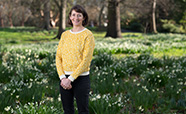 Dr Katie Douglas foresees a day when people will visit a mental health service, undergo an assessment and walk away with a course of psychological therapy tailored to their own profile of challenges and strengths.
Dr Katie Douglas foresees a day when people will visit a mental health service, undergo an assessment and walk away with a course of psychological therapy tailored to their own profile of challenges and strengths.
Re-coding the mysteries of cancer genetics
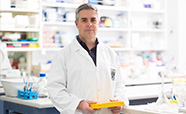 Associate Professor Logan Walker: "My research is focused on developing new methods to help evaluate the clinical significance of genetic variants in our DNA code. The major challenge that comes with this is figuring out how to decode this information to benefit patients and their whānau".
Associate Professor Logan Walker: "My research is focused on developing new methods to help evaluate the clinical significance of genetic variants in our DNA code. The major challenge that comes with this is figuring out how to decode this information to benefit patients and their whānau".
Shouldering responsibility
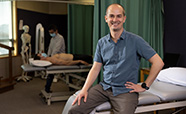 Based in the Centre for Heath, Activity and Rehabilitation Research, Associate Professor Daniel Ribeiro is engaged in research that aims to improve clinical outcomes for people with musculoskeletal pain due to injuries and disorders, with a focus on shoulder pain.
Based in the Centre for Heath, Activity and Rehabilitation Research, Associate Professor Daniel Ribeiro is engaged in research that aims to improve clinical outcomes for people with musculoskeletal pain due to injuries and disorders, with a focus on shoulder pain.
Sovereign rights to health and wellbeing
 Dr Paula Toko King completed a medical degree at the University of Auckland and was on track to become a paediatrician before switching to public health, a move prompted by seeing children return again and again with preventable illnesses.
Dr Paula Toko King completed a medical degree at the University of Auckland and was on track to become a paediatrician before switching to public health, a move prompted by seeing children return again and again with preventable illnesses.
Transforming cancer treatment
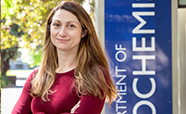 Dr Sarah Diermeier: “I decided that there needs to be a better way, so I went to the library and read up on what I needed to study to become a cancer researcher, all with the goal in mind of one day developing new cancer drugs that increase the survival of cancer patients but also are much better tolerated by cancer patients.”
Dr Sarah Diermeier: “I decided that there needs to be a better way, so I went to the library and read up on what I needed to study to become a cancer researcher, all with the goal in mind of one day developing new cancer drugs that increase the survival of cancer patients but also are much better tolerated by cancer patients.”
Turning up the heat
 Dr Kate Thomas (Surgical Sciences, Dunedin School of Medicine) is researching cardiovascular and cerebrovascular responses to exercise and environmental stressors such as heat, cold and hypoxia, to better understand and apply these stressors for health benefits for a range of common chronic conditions.
Dr Kate Thomas (Surgical Sciences, Dunedin School of Medicine) is researching cardiovascular and cerebrovascular responses to exercise and environmental stressors such as heat, cold and hypoxia, to better understand and apply these stressors for health benefits for a range of common chronic conditions.
Research in our four academic divisions
View more research activity in our academic divisions: